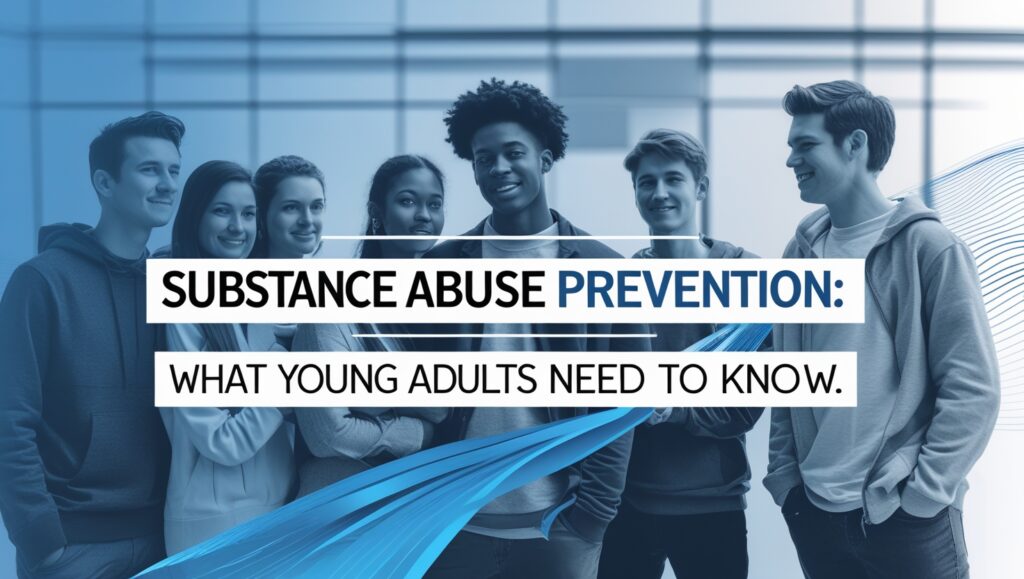
Prevention of Substance Abuse
What Young Adults Need to Know
Substance Abuse Prevention: What Young Adults Need to Know
Substance abuse is a growing concern among young adults, and understanding its risks and prevention strategies is crucial. Adolescence and early adulthood are periods of experimentation, self-discovery, and socialization, making individuals in this age group more susceptible to substance use. However, by being informed, practicing self-care, and making responsible choices, young adults can navigate this stage of life safely and healthily.
Understanding Substance Abuse
Substance abuse refers to the harmful or hazardous use of psychoactive substances, including alcohol, tobacco, and illicit drugs. It can lead to addiction, a chronic disease that affects the brain’s reward system, making it difficult for individuals to control their use despite negative consequences.
Commonly Abused Substances
Alcohol: Often socially accepted but can lead to dependence and health risks if misused.
Marijuana: Perceived as harmless by some, but long-term use can impact memory, cognition, and mental health.
Prescription Drugs: Opioids, stimulants, and sedatives can be highly addictive when misused.
Nicotine & Vaping: E-cigarettes and traditional tobacco products can lead to nicotine addiction and respiratory issues.
Illicit Drugs: Cocaine, heroin, methamphetamine, and other illegal substances pose severe health and legal risks.
Risk Factors for Substance Abuse
Understanding risk factors can help young adults make informed decisions. These include:
Peer Pressure: The influence of friends and social groups can lead to experimentation with substances.
Mental Health Issues: Anxiety, depression, and stress can contribute to substance use as a coping mechanism.
Family Environment: A history of substance abuse in the family increases the likelihood of addiction.
Social Media & Pop Culture: The glorification of drug use in entertainment and online platforms can shape young people’s perceptions.
Lack of Education: Misconceptions about substances often lead to misuse and dangerous behaviors.
The Consequences of Substance Abuse
The impact of substance abuse extends beyond the user and affects their family, community, and society at large. Some of the serious consequences include:
Health Risks: Liver damage, respiratory issues, heart disease, weakened immune system, and overdose.
Mental Health Issues: Increased risk of anxiety, depression, psychosis, and suicidal thoughts.
Academic & Career Setbacks: Poor performance, absenteeism, and job loss.
Legal Problems: DUI charges, possession, and criminal records that affect future opportunities.
Strained Relationships: Trust issues with family and friends, leading to social isolation.
Prevention Strategies for Young Adults
The good news is that substance abuse can be prevented with the right knowledge and strategies. Here’s how young adults can protect themselves:
1. Educate Yourself and Others
Knowledge is a powerful tool in preventing substance abuse. Schools, community centers, and online resources offer valuable information on the dangers of drugs and alcohol. Share this knowledge with peers to build a supportive network.
2. Develop Healthy Coping Mechanisms
Stress and emotional struggles can drive young adults toward substance use. Instead, engage in positive coping strategies such as:
Regular exercise
Meditation and mindfulness
Journaling and self-reflection
Talking to a trusted friend or mentor
3. Choose Your Friends Wisely
Surrounding yourself with like-minded individuals who respect your boundaries and encourage healthy habits can reduce peer pressure.
4. Learn to Say No
Peer pressure is a significant factor in substance abuse. Practice assertive communication and confidently say no to situations that make you uncomfortable. Some polite refusals include:
“I’m good, thanks.”
“I have an early day tomorrow.”
“I don’t drink/use, but I’m happy to hang out.
5. Set Goals and Priorities
Having a clear vision for your future helps you stay focused and avoid distractions like substance abuse. Set academic, career, and personal development goals to keep yourself motivated.
6. Seek Support When Needed
If you or someone you know is struggling with substance use, seek professional help. Counselors, support groups, and hotlines provide guidance and assistance without judgment.
The Role of Families and Communities
Families and communities play a crucial role in substance abuse prevention. Parents, educators, and mentors can:
Foster Open Communication: Create a safe space for young adults to discuss their concerns and challenges.
Be Role Models: Demonstrate responsible behavior regarding alcohol and drug use.
Monitor and Guide: Encourage healthy activities and ensure young adults are in positive environments.
Support Prevention Programs: Participate in awareness campaigns and community initiatives.
Conclusion
Substance abuse is a serious issue, but young adults can make informed decisions to protect themselves. By understanding the risks, recognizing triggers, and developing healthy habits, they can build a future free from the harmful effects of addiction. Education, support, and self-awareness are key components of prevention. If you or someone you know is struggling, remember that help is available, and it’s never too late to make a positive change.
